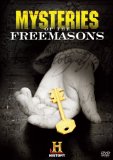| Reviews & Columns |
|
Reviews DVD TV on DVD Blu-ray 4K UHD International DVDs In Theaters Reviews by Studio Video Games Features Collector Series DVDs Easter Egg Database Interviews DVD Talk Radio Feature Articles Columns Anime Talk DVD Savant Horror DVDs The M.O.D. Squad Art House HD Talk Silent DVD
|
DVD Talk Forum |
|
|
| Resources |
|
DVD Price Search Customer Service #'s RCE Info Links |
|
Columns
|
|
|
Mysteries of the Freemasons
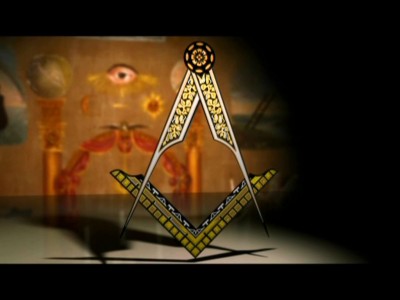
My first-hand experience with Freemasonry extends to my high school graduation in our local Masonic Temple auditorium, and that's about it. So I came in pretty clean to Mysteries of the Freemasons. I've heard about one or two of the conspiracies about this organization, and through other documentaries I've picked up a few bits and pieces concerning the organization's symbols and rituals, but nothing detailed about how the Masons were supposedly founded, or the organization's place in history (particularly our own history here in America). Thus, the info I gleaned from Mysteries of the Freemasons, I'm taking on faith. In typical History fashion, experts and authors in the field discussed are interviewed, and their comments are illustrated and expanded upon by an overall narration (History stalwart Michael C. Hall), by live-action re-creations, by maps, location shooting, and CGI graphics. Interviewees featured on Mysteries of the Freemasons include S. Brent Morris, Akram Elias, Christopher Knight, Steve Bullock, Dan Burstein, Karen Ralls, and David Shugarts.
I suppose the biggest eye-opener I encountered in Mysteries of the Freemasons is the notion that - according to Mason Akram Elias, it should be noted - there is no "One" secret within the brotherhood of Masonry. The secret is within the individual, pertaining to what he or she can achieve. The symbols of the Mason, such as the square (which should remind a Mason to "square" his life along moral lines), the compass (a reminder to be circumspect in one's passions), and the letter "G" (for God and geometry), may seem mysteriously enigmatic to the uninitiated, but they really are only allegorical symbols used to unlock the secret potential of each Mason. Now of course, these are Masons telling the viewer this in the documentary. Are there other meanings within the secret sect not being told to us? Are there other rituals or secret words or handshakes that denote something far more elusive than what is offered up as an explanation here? I don't know. The Masons say there isn't any other great "secret" within the organization...but again...who knows?
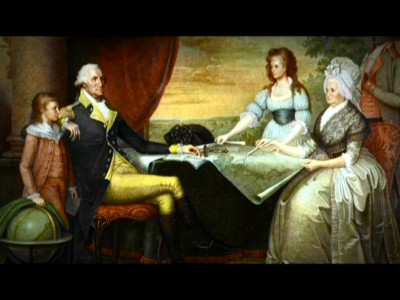
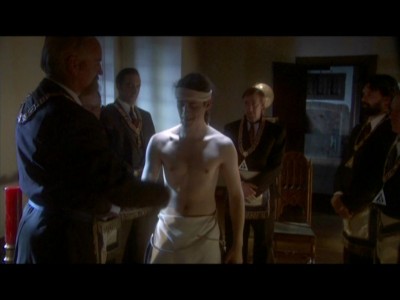
I found the discussion of Masonry evolving into a repository of intellectual and religious freedom during the Enlightenment quite interesting, as well. The documentary doesn't go into a lot of detail, but it suggests that the centuries-later movement towards democratic revolutions in Europe was germinated within the Freemason society, where originally stone cutters - regardless of their rank of skill - were referred to as "brother," a democratic ideal that went further to include a tolerance of various religions. Thus, when the Catholic Church started to flex its power against the Enlightenment, gentlemen of science sought out the Freemason organization as a shelter for intellectual curiosity and discussion. The documentary, unfortunately, stops short of truly connecting up the dots for Masons being central to democratic revolutions that swept the 18th century, but it's an intriguing idea, nonetheless. Mysteries of the Freemasons then moves into a discussion about how the origins of Masonry may lie in the Knights Templar, where by-now familiar generalizations about the Templar history is illustrated.
Part 2 of Mysteries of the Freemasons deals with Freemasonry and specifically, the founding and subsequent history of America. I was surprised to learn how open the Masonic rites were in conjunction with the everyday life of America, with the popularity of the Order coming in no small part from George Washington's participation in it (I thought it was fascinating to learn that at the laying of the Capitol building cornerstone, Washington performed a Masonic ritual). I would have liked more information, though, on the subsequent "downfall" of the Order during the William Morgan incident of 1826 (where Morgan, a Mason threatening to reveal the Order's secrets, disappeared amid charges that the Order kidnapped and murdered him). As well, I didn't think nearly enough information was given about the resurgence of the Order under the direction of the truly mysterious Albert Pike, either (Is it me or do the Masons on camera seem slightly uncomfortable discussing Pike?). I found the final discussion concerning the possible Masonic symbols and favorite ratios and geometric forms embedded in the design of Washington, D.C., the most intriguing aspect of the documentary, but again, taking into account the nature of this generalized doc, nothing is gone into too deeply. Again, though: if this is introductory information to you, Mysteries of the Freemasons is a speedy, polished way for you to get your initial bearings on the subject.
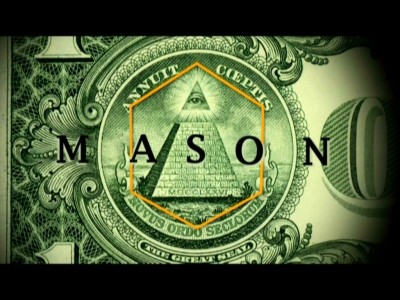
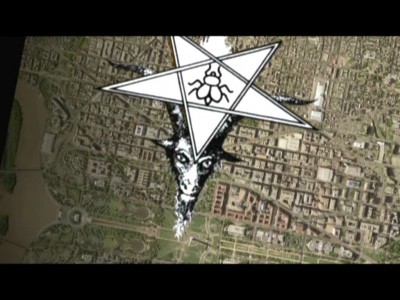
The DVD
The Video
Mysteries of the Freemasons is presented, unfortunately, in a non-anamorphic, 1.78:1 letterboxed transfer that looks reasonably bright and sharp, with no significant image anomalies, but with the ever-present interlacing factor we always see with these History docs (lots of jaggies in the transitions). Colors are strong and correctly valued. Overall, a nice transfer (but a smaller monitor helps).
The Audio
The Dolby Digital English 2.0 stereo audio mix is entirely adequate for this largely dialogue-driven doc. Loudness levels are strong, and hiss is minimal. Close-captions are said to be available, but on all of my equipment, they inexplicably came and went throughout the program.
The Extras
As a big extra, a bonus episode of History's Mysteries from 2001 - Secret Societies - is included here. It's an equally speedy - and very superficial - look at some of the conspiracy theories involving secret societies such as the Trilateral Commission, the Council on Foreign Relations, and the ultra-secret Bildeberg group. I particularly liked the quick peek at the Skull and Crossbones group (who knew the group was so whimsical, with its clocks set ahead five minutes, while our time is known as "Barbarian time"). Perhaps the funniest part of the documentary is its refusal to fully identify its principal interviewee: David Icke, who's merely labeled an author here...but not as the author who actually wrote that our world masters are actually, um...humanoid reptiles from another world. I wonder why History left that out?
Final Thoughts
Certainly generalized and superficial, Mysteries of the Freemasons still gives an entertaining, speedy introduction to newcomers to the subject. It isn't the last word on the subject, but it may spur a viewer on to finding out more about its subject matter...if our handful of humanoid reptile world masters will let us. A rental is best for Mysteries of the Freemasons.
Paul Mavis is an internationally published film and television historian, a member of the Online Film Critics Society, and the author of The Espionage Filmography .


|
| Popular Reviews |
| Sponsored Links |
|
|
| Sponsored Links |
|
|
| Release List | Reviews | Shop | Newsletter | Forum | DVD Giveaways | Blu-Ray | Advertise |
|
Copyright 2024 DVDTalk.com All Rights Reserved. Legal Info, Privacy Policy, Terms of Use,
Manage Preferences,
Your Privacy Choices | |||||||









